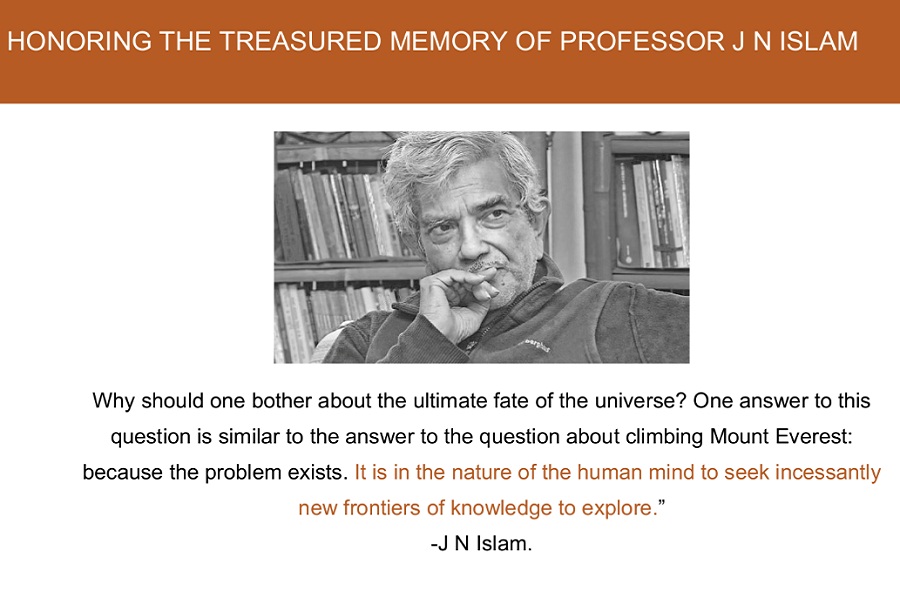Professor Jamal Nazrul Islam: A Bangladeshi luminary in Mathematical Physics and Cosmology

Published :
Updated :

Imagine being 12, where discussing Stephen Hawking's 'A Brief History of Time' at Olympiad contests or casually dropping 'The Big Bang Theory' in conversations was my way of appearing intellectually calm among my peers. But it was during 8th grade that I learned about the legend Professor Jamal Nazrul Islam (JNI), a Bangladeshi cosmologist and a close friend of Stephen Hawking.
Channelling my inner 'Sherlock Holmes,' I dove into the depths of the internet, eager to uncover more about him. Even my favourite TV series is named 'The Big Bang Theory', where Stephen Hawking himself has a cameo; there should be something interesting about Professor Islam, too, right?
I wish I were right. In the vast expanse of the internet, we find a lot of basic information about Professor JNI. Yet, only a few articles delve into his personality and unwavering commitment to mentoring Bangladeshi students in scientific research and mathematics.
I was wonderstruck to learn how eminent scientists like Freeman Dyson, Stephen Hawking, and Abdus Salam have appreciated JNI's contributions to mathematics and cosmology—still, barely any Bangladeshi talk about him.
From 2020, each year, the Department of Mathematics (University of Dhaka) celebrates International Day of Mathematics by organizing Mathematics competitions for high school and undergraduate students.
I used to participate here, and last year, surprisingly, I noticed a presentation about Professor JNI led by Dr. Md Kamrujjaman (Professor, Department of Mathematics, University of Dhaka), currently my research supervisor.
I read Professor Islam's obituary, which inspired me to collect information independently. I was fascinated to learn that JNI possessed a scientific mind and was keen to play piano and sitar or practice Rabindra Sangeet and classical music.
JNI authored 'The Ultimate Fate of The Universe,' and behold, the universe sets my fate for me to present a talk on him. Quite the celestial coincidence, right?
It took months to gather scattered articles here and there and merge them into a proper presentation. However, the process made me realize JNI's profound dedication to his motherland. Leaving a luxurious abroad life to work at Chittagong University for a 2,800 salary, founding RCMPS visioning to empower Bangladeshi STEM enthusiasts, and having an extreme passion for Bangladeshi classical music, JNI has shown us that a valid form of higher education only makes us humble, patriotic and down-to-earth individual.
Despite his rigorous scientific endeavours, Professor Islam maintained a profound connection with his students and the academic community in Bangladesh.
His commitment to mentorship and his passion for igniting curiosity in the minds of young scholars were as integral to his legacy as his scientific contributions.
Professor JNI did not just create a legacy of scientific inquiry; he laid the foundations for a culture of intellectual pursuit and mentorship that continues to inspire generations.
One of the guests at the event was Professor Mohammad Kaykobad (Former faculty member of the CSE Department, BUET), whom I have looked up to since the beginning of my Olympiad and Programming contest participation.
So, comments about converting my content to a repository article were genuinely fulfilling. Even after his passing, Professor Jamal Nazrul Islam's legacy continues reverberating through academia and beyond, stirring the souls of young minds like mine.
The mere acknowledgement of his contributions gives me goosebumps. It's a stark reminder of one individual's monumental impact on the world and, more so, on the fabric of future generations.
His legacy is a living, breathing inspiration that pushes us to explore beyond the visible, to question the universe and our place within it, and to pursue knowledge with the same enthusiasm and dedication he exemplified.
It's a reminder that our contributions to the world, no matter how small they seem, can ripple through time, inspiring countless others long after we're gone.
Maisha Morshed is a Junior Research Assistant, Department of Mathematics, University of Dhaka)


 For all latest news, follow The Financial Express Google News channel.
For all latest news, follow The Financial Express Google News channel.